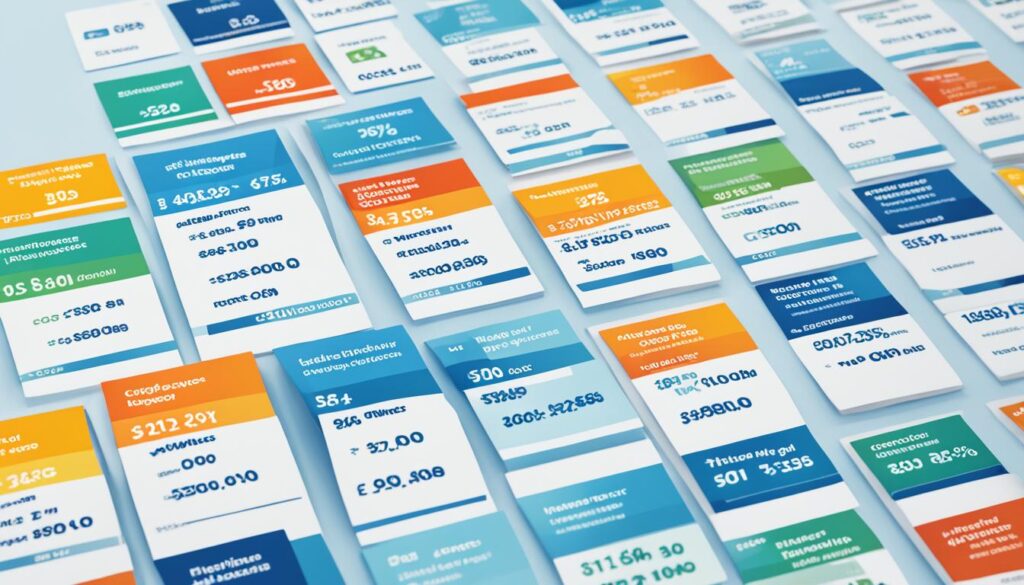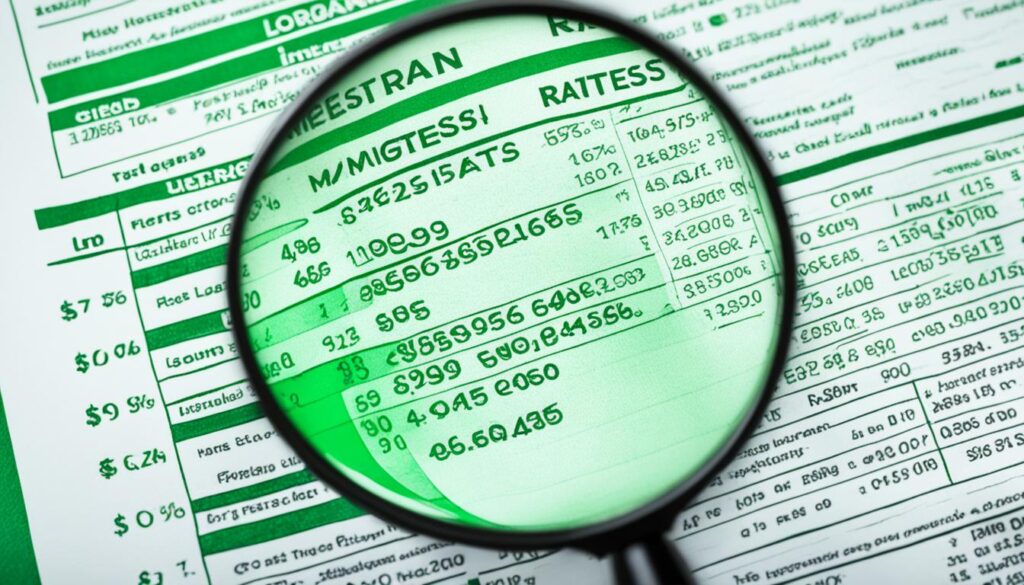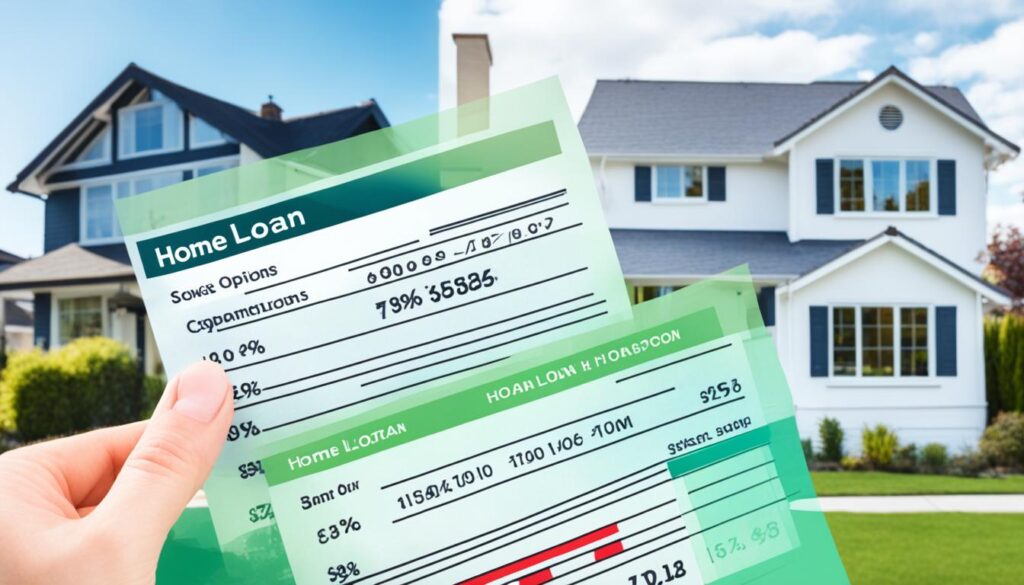Home Loan: Looking for the best mortgage rates is key for both homebuyers and homeowners. Bank rate helps by giving expert advice and financial tools. These can guide you through finding the best home loan rates.
Bank rate’s latest mortgage news and tools shed light on current mortgage rate trends. They also show the best strategies to get low-interest home loans. Using Bank rate’s info, the top offers are currently 0.7% less than the national rate. This means you could save a lot every year, based on a $340,000 loan for 30 years.
Currently, the average rate for a 30-year fixed mortgage is 7.05%. This is down a bit compared to last week. However, the average refinance rate for a 30-year loan is slightly higher at 7.09%. It’s predicted that mortgage rates will go lower by 2024. But, it’s still very important to shop around. By comparing offers from different lenders, you can find the best rates out there.
Key Takeaways: Home Loan
- Bank rate helps consumers with its expert advice and tools to understand the home loan market.
- The deals on Bank rate are currently 0.7% better than the national average mortgage rate, leading to big yearly savings.
- Now, the average rate for a 30-year fixed mortgage is at 7.05%, and for refinancing, it’s 7.09%.
- It’s expected that mortgage rates will decrease by 2024. Even so, comparing different lenders is crucial to find the best deals.
- Being aware of the latest mortgage rates and knowing how to get the lowest rates are vital for homebuyers and owners.
Understanding Mortgage Interest Rates
Mortgage rates change because of different reasons. These can be personal to the buyer or from the whole economy. Knowing what affects these rates can help both buyers and owners with their decisions when getting a mortgage.
Also Read : How Can I Prepare For The Medical School Entrance Exam?
Factors Influencing Mortgage Rates
Many things affect how much interest you pay on your mortgage. Like your credit score, the amount you put down, and the loan type. A good credit score and a big down payment can lead to a lower interest rate. This is because lenders see less risk in giving loans to people with good credit scores and those who pay more upfront.
Role of Credit Score and Down Payment
Your credit score is key in deciding your mortgage rate. A higher score means you might get a lower rate. It shows lenders you’re good at paying debts. A big down payment can also reduce your rate by making the loan amount smaller. This makes you look like less of a risk to the lender.
The kind of loan also changes your interest rate. For instance, jumbo loans or loans for buying properties to rent can have higher rates. It’s important for borrowers to know about different loan types and their rates to pick the best one for them.
Also Read : What Are The Best Medical Services For Mental Health?
| Loan Type | Average Interest Rate | Factors Influencing Rate |
|---|---|---|
| Conventional Loan | 7.05% | Factors include credit score, down payment, and loan size |
| FHA Loan | 6.84% | Things like credit score, down payment, loan size, plus mortgage insurance matter |
| VA Loan | 6.64% | Service in the military, zero down payment, and the loan size are important |
| Jumbo Loan | 7.32% | Loan size, credit score, and down payment are significant factors |
Current Mortgage Rate Trends

For both homebuyers and those who own homes, knowing the latest in interest rates is key. The mortgage, interest rates, and types of loans you can get all have a big impact on how much your home will actually cost you. This info is really important when you’re looking at getting a home loan and keeping it affordable.
Also Read : What Are The Future Trends In Medical Technology?
30-Year Fixed-Rate Mortgage
Right now, the average rate for a 30-year fixed-rate mortgage is 7.05%. It’s down slightly from last week by just one basis point. This kind of loan gives you an interest rate that stays the same for the whole life of the loan. That’s why many homeowners like it.
15-Year Fixed-Rate Mortgage
If you want to pay off your house quicker, look at the 15-year refinance interest rate. It’s now at 6.55%, which is 6 basis points lower than last week. With this mortgage choice, homeowners can pay less in interest over time and get out of debt faster.
Adjustable-Rate Mortgages (ARMs)
ARMs work a bit differently. They start with an interest rate that can change over time. Even though they often begin with lower rates than fixed-rate loans, these changes can make it hard to keep your budget steady. Not everyone finds ARMs suitable for them because of this.
No matter what kind of loan you’re considering, and regardless of the current rates, it’s wise to compare deals from different lenders. By making these comparisons, borrowers can find the best refinance loan and the most fitting loan rates for their particular financial needs. Knowing about the various types of mortgage loans and interest rates can help homeowners save a lot of money over the life of their home loan.
Also Read : What Are The Best Merit Based Scholarships For High School Students?
Comparing Lenders for the Best Rates

Securing the lowest mortgage interest rate means shopping around and comparing multiple lenders. Rates can differ a lot, even for the same loan type and term. Knowing the Annual Percentage Rate (APR) is key here.
Also Read : What Are The Available Scholarships For Graduate Students?
Importance of Shopping Around
Comparing lenders can lead to big savings. According to Bank rate’s data, you could save hundreds yearly by just getting a rate that’s 0.7% below the national average. This is for a 30-year, $340,000 home mortgage loan. It’s worth your time to research and compare mortgage lenders to find the best deal for you.
Understanding Annual Percentage Rate (APR)
The APR shows the real cost of a loan, with interest rate and fees included. It helps you know the total loan cost over its life. This is important for picking a lender and loan type with the lowest cost of the loan and monthly payment amount.
Shopping around and comparing APR and offers from different lenders is crucial. It helps you boost your chances of getting the best rates and loan approval for your finances.
Strategies to Get the Lowest Home Loan Rate

Getting a low home loan interest rate is crucial for many. Luckily, there are smart ways to find these rates. Housing buyers and owners can follow a few strategies.
Improving Credit Score
Enhancing your credit score is very important. Lenders see people with high scores as less risky. This often leads to better interest rates. Paying bills on time, reducing debt, and fixing credit report errors can help a lot.
Increasing Down Payment
Making a bigger down payment can also cut your risk level. This usually lowers the rate lenders might offer. Even increasing your down payment by 3-5% can make a difference. It shows lenders that you’re a lower risk, so they might offer you a lower interest rate.
Considering Mortgage Points
Buying mortgage points upfront is another option. Mortgage points lower the interest rate. But it’s key to do the math. You need to check if the savings for the long run are more than the upfront costs. Think about how long you’ll stay in your home and the total loan cost. This way, you can decide if mortgage points are the right move for you.
Home Loan Options and Interest Rates

When you need a home loan, you’ve got choices. Each type of loan has its own special features and interest rates. It’s important to know about different home loan types to pick the best one for you.
Conventional Loans
Most people in the U.S. go for conventional loans. You typically need at least a 620 credit score and a 3% down payment. Because they’re not backed by the government, conventional loans might have lower interest rates than other options. This is great news for those with a good credit score and some money saved for a down payment.
FHA Loans
FHA loans are backed by the Federal Housing Administration. They’re ideal for first-time homebuyers and those with lower incomes because they’re easier to qualify for. You only need a credit score of 580 and a tiny 3.5% down payment.
VA Loans
VA loans help military service members, veterans, and their families. They’re backed by the U.S. Department of Veterans Affairs. With VA loans, you can get a home without any down payment, and they often have lower interest rates.
Jumbo Loans
Jumbo loans are for big homes that exceed typical loan limits. They’re often used for expensive properties. Because they’re bigger loans, jumbo loans can have higher interest rates. To get one, you usually need a strong credit score, a big down payment, and a good handle on your debts.
Factors Affecting Mortgage Rate Fluctuations
Mortgage rates change because of a mix of economic and political stuff. This includes what the Federal Reserve does. The Federal Reserve sets short-term interest rates. When these rates go up or down, mortgage rates follow.
Federal Reserve Policies
The Federal Reserve is like the U.S.’s money boss. It controls things like the federal funds rate. This impacts the Mortgage market a lot. Raise rates mean you pay more on your mortgage. Lower rates mean you save.
Economic Indicators
Certain signs, like inflation and job numbers, show how the economy is doing. The Federal Reserve looks at these to decide on Future plans. If the economy is growing too fast, they might increase rates. This then makes borrowing more costly for you.
Housing Market Conditions
The housings market also affects mortgage rates. If people are buying more homes, rates could rise. This helps lenders stay safe. But, in a slow market, rates might drop to attract buyers. Things like how many homes are available or their prices matter, too.
Learning about what moves mortgage rates can guide good choices in home financing. Keeping an eye on the economy and what the Federal Reserve does is smart. This way, both buyers and homeowners can get the best deals on their mortgage rates.
Also Read: Funding Your Future: Comprehensive Student Loan Options
FAQs
Q: What is a mortgage calculator and how can it help me with my home loan?
A: A mortgage calculator is a tool that helps you estimate your potential monthly mortgage payments based on factors such as the loan amount, interest rate, and loan term. It can help you determine how much you can afford to borrow and what your monthly payments might look like.
Q: What are the key benefits of refinancing my home loan?
A: Refinancing your home loan can potentially lower your interest rate, reduce your monthly mortgage payments, shorten the loan term, or help you tap into your home equity. It can also be a way to consolidate debt or make home improvements.
Q: How can I compare different mortgage loan programs to find the best one for my needs?
A: You can compare mortgage loan programs by looking at the interest rates, loan terms, closing costs, and any special features each program offers. It’s important to consider your financial goals and needs when choosing the right mortgage program.
Q: What are fixed-rate mortgages and adjustable-rate mortgages, and which one is better for me?
A: A fixed-rate mortgage has a stable interest rate throughout the loan term, while an adjustable-rate mortgage (ARM) has an interest rate that can change after an initial fixed period. The best option for you depends on factors such as how long you plan to stay in the home and your risk tolerance.
Q: What factors should I consider when deciding between buying a home or refinancing my current mortgage?
A: When deciding between buying a home or refinancing, consider factors such as your current financial situation, long-term goals, interest rates, and the housing market. It’s important to weigh the pros and cons of each option based on your individual circumstances.
Q: How can I estimate my monthly mortgage payments and total costs when buying a home?
A: You can estimate your monthly mortgage payments and total costs by using a mortgage calculator and inputting details such as the loan amount, interest rate, loan term, and any additional costs like property taxes and insurance.
Q: What are some key terms I should be familiar with when applying for a mortgage?
A: Some key terms to be familiar with when applying for a mortgage include loan term, closing costs, principal and interest, private mortgage insurance (PMI), and monthly mortgage payment. Understanding these terms can help you navigate the mortgage application process more effectively.
